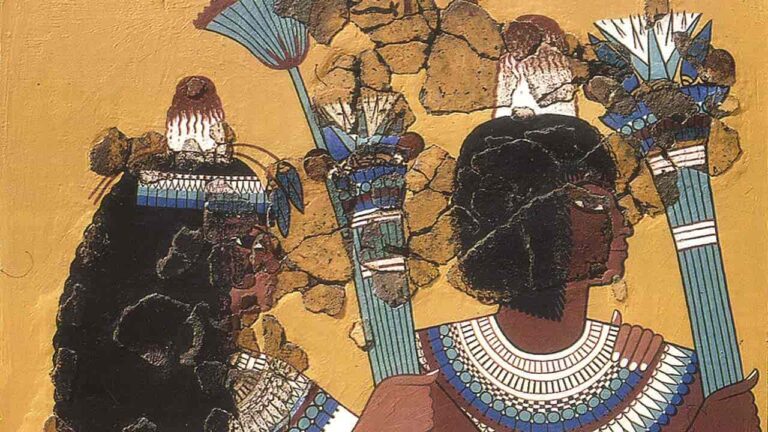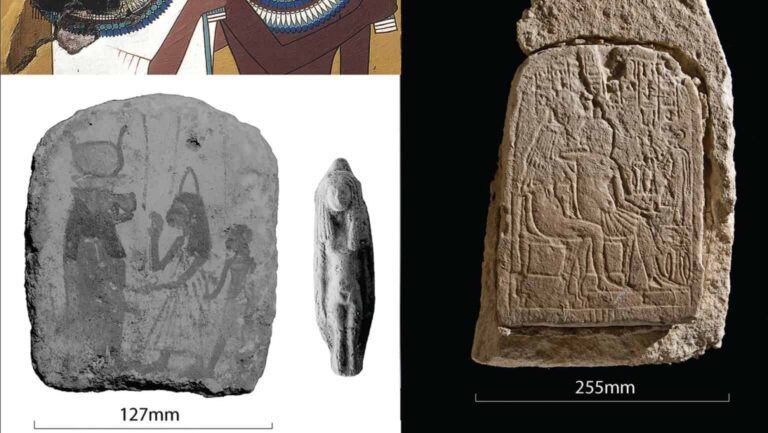Ancient Egyptian Head Cones Were Real, Grave Excavations Suggest
Researchers have revealed details of mysterious cone-shaped headgear discovered in the ancient Egyptian city of Amarna.
“Ancient Egyptian art frequently depicted people wearing cone-shaped headgear, but none had ever been found,” the researchers explained in a statement emailed to Fox News.
Archaeologists from the Amarna project have been working with Egypt’s Ministry of Antiquities to analyze the mysterious head cones. A head cone was discovered at a grave in Amarna in 2010 and another head cone was uncovered at the site five years later.
“This confirms the objects actually existed, which some researchers were sceptical of,” the researchers added in the statement. “Instead, they thought they were just artistic additions, like Christian halos.”

“It is unknown why these cones were included in the burials,” the experts continued. “They may have been thought to purify the wearer so they could engage with the rituals and deities of the afterlife. Alternatively, they could be connected with ideas of fertility and resurrection.”
A paper on the research is published in the journal Antiquity.
Egypt continues to reveal new details of its right history. Archaeologists, for example, recently discovered a long-lost 2,200-year-old ancient temple linked to Pharaoh Ptolemy IV.
In a separate project, an ancient fortress built by Pharaoh Ramses II is revealing its secrets. Archaeologists recently uncovered an ancient cemetery near the famous Giza pyramids just outside Cairo.
In another project, experts uncovered the 2,500-year-old remains of a powerful high priest in dramatic fashion.
The opening of the priest’s stone sarcophagus was broadcast by the Discovery Channel during “Expedition Unknown: Egypt Live,” a two-hour live event. Archaeologists discovered what they describe as an “exquisitely preserved” mummy inside the sealed sarcophagus, covered in gold banding.

The incredible find was made at Al-Ghorifa, a remote site about 165 miles south of Cairo. Located within the inner chambers of the burial site, experts accessed the sarcophagus via a network of ancient tunnels.
Elsewhere, archaeologists found a large ram-headed sphinx that is linked to King Tutankhamun’s grandfather. In other projects, a teenage girl’s skeleton was discovered in a mysterious grave near the Meidum pyramid, south of Cairo.
In April, experts announced the discovery of dozens of mummies in ancient desert burial chambers. Archaeologists also recently explained the strange brown spots on some of the paintings in King Tutankhamun’s tomb.

In January, archaeologists announced the discovery of ancient tombs in the Nile Delta north of Cairo. In a separate project, two ancient tombs dating back to the Roman period were uncovered in Egypt’s Western Desert.
Archaeologists discovered a stunning sphinx statue at an ancient temple in southern Egypt in a separate project.
Last summer, experts unlocked the secrets of a mysterious ancient ‘cursed’ black granite sarcophagus. The massive coffin, which was excavated in the city of Alexandria, was found to contain three skeletons and gold sheets with the remains.
Archaeologists also found the oldest solid cheese in the tomb of Ptahmes, mayor of the ancient city of Memphis.
A mummy buried in southern Egypt more than 5,000 years ago has also revealed its grisly secrets, shedding new light on prehistoric embalming practices.
